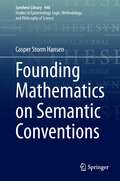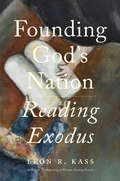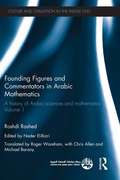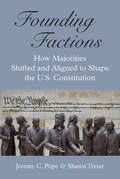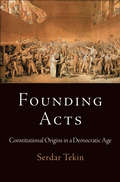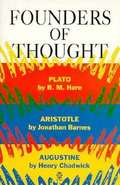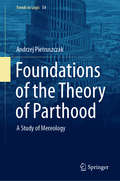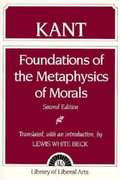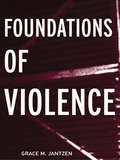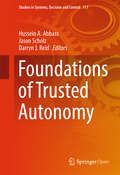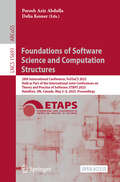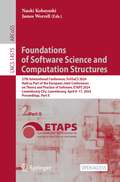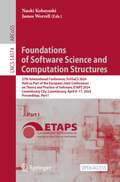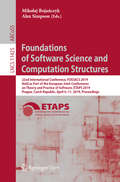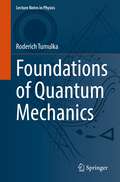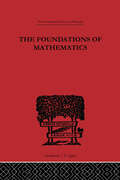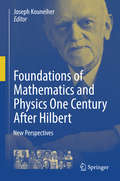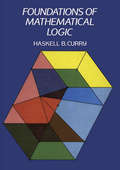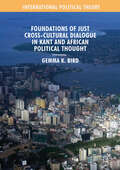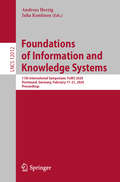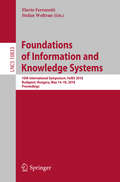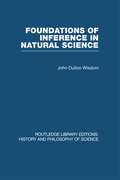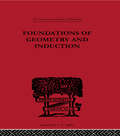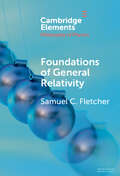- Table View
- List View
Founding Mathematics on Semantic Conventions (Synthese Library #446)
by Casper Storm HansenThis book presents a new nominalistic philosophy of mathematics: semantic conventionalism. Its central thesis is that mathematics should be founded on the human ability to create language – and specifically, the ability to institute conventions for the truth conditions of sentences.This philosophical stance leads to an alternative way of practicing mathematics: instead of “building” objects out of sets, a mathematician should introduce new syntactical sentence types, together with their truth conditions, as he or she develops a theory.Semantic conventionalism is justified first through criticism of Cantorian set theory, intuitionism, logicism, and predicativism; then on its own terms; and finally, exemplified by a detailed reconstruction of arithmetic and real analysis.Also included is a simple solution to the liar paradox and the other paradoxes that have traditionally been recognized as semantic. And since it is argued that mathematics is semantics, this solution also applies to Russell’s paradox and the other mathematical paradoxes of self-reference.In addition to philosophers who care about the metaphysics and epistemology of mathematics or the paradoxes of self-reference, this book should appeal to mathematicians interested in alternative approaches.
Founding God’s Nation: Reading Exodus
by Leon R KassIn this long-awaited follow-up to his 2003 book on Genesis, humanist scholar Leon Kass explores how Exodus raises and then answers the central political questions of what defines a nation and how a nation should govern itself. Considered by some the most important book in the Hebrew Bible, Exodus tells the story of the Jewish people from their enslavement in Egypt, through their liberation under Moses&’s leadership, to the covenantal founding at Sinai and the building of the Tabernacle. In Kass&’s analysis, these events began the slow process of learning how to stop thinking like slaves and become an independent people. The Israelites ultimately founded their nation on three elements: a shared narrative that instills empathy for the poor and the suffering, the uplifting rule of a moral law, and devotion to a higher common purpose. These elements, Kass argues, remain the essential principles for any freedom-loving nation today.
Founding Figures and Commentators in Arabic Mathematics: A History of Arabic Sciences and Mathematics Volume 1 (Culture and Civilization in the Middle East)
by Roshdi RashedIn this unique insight into the history and philosophy of mathematics and science in the mediaeval Arab world, the eminent scholar Roshdi Rashed illuminates the various historical, textual and epistemic threads that underpinned the history of Arabic mathematical and scientific knowledge up to the seventeenth century. The first of five wide-ranging and comprehensive volumes, this book provides a detailed exploration of Arabic mathematics and sciences in the ninth and tenth centuries. Extensive and detailed analyses and annotations support a number of key Arabic texts, which are translated here into English for the first time. In this volume Rashed focuses on the traditions of celebrated polymaths from the ninth and tenth centuries ‘School of Baghdad’ - such as the Banū Mūsā, Thābit ibn Qurra, Ibrāhīm ibn Sinān, Abū Ja´far al-Khāzin, Abū Sahl Wayjan ibn Rustām al-Qūhī - and eleventh-century Andalusian mathematicians like Abū al-Qāsim ibn al-Samh, and al-Mu’taman ibn Hūd. The Archimedean-Apollonian traditions of these polymaths are thematically explored to illustrate the historical and epistemological development of ‘infinitesimal mathematics’ as it became more clearly articulated in the eleventh-century influential legacy of al-Hasan ibn al-Haytham (‘Alhazen’). Contributing to a more informed and balanced understanding of the internal currents of the history of mathematics and the exact sciences in Islam, and of its adaptive interpretation and assimilation in the European context, this fundamental text will appeal to historians of ideas, epistemologists, mathematicians at the most advanced levels of research.
Founding Factions: How Majorities Shifted and Aligned to Shape the U.S. Constitution
by Jeremy C Pope Shawn TreierThe fundamental importance of the 1787 Constitutional Convention continues to affect contemporary politics. The Constitution defines the structure and limits of the American system of government, and it organizes contemporary debates about policy and legal issues—debates that explicitly invoke the intentions and actions of those delegates to the Convention. Virtually all scholarship emphasizes the importance of compromise between key actors or factions at the Convention. In truth, the deep structure of voting at the Convention remains somewhat murky because the traditional stories are incomplete. There were three key factions at the Convention, not two. The alliance of the core reformers with the slave interests helped change representation and make a stronger national government. When it came time to create a strong executive, a group of small state delegates provided the crucial votes. Traditional accounts gloss over the complicated coalition politics that produced these important compromises, while this book shows the specific voting alignments. It is true that the delegates came with common purposes, but they were divided by both interests and ideas into three crosscutting factions. There was no persistent dominant coalition of reformers or nationalists; rather, there was a series of minority factions allying with one another on the major issues to fashion the compromise. Founding Factions helps us understand the nature of shifting majorities and how they created the American government.
Founding Acts: Constitutional Origins in a Democratic Age
by Serdar TekinAll democratic constitutions feature "the people" as their author and ultimate source of legitimacy. They claim to embody the political form that citizens are in some sense supposed to have given themselves. But in what sense, exactly? When does a constitution really or genuinely speak for the people? Such questions are especially pertinent to our present condition, where the voice of "the people" turns out to be irrevocably fragmented, and people themselves want to speak and be heard in their own voices.Founding Acts explores the relationship between constitutional claims of popular sovereignty and the practice of constitution-making in our pluralistic age. Serdar Tekin argues that the process of making a constitution, or its pedigree, is as morally and politically significant as its content. Consequently, democratic constitution-making is not only about making a democratic constitution but also about making it, as much as possible, democratically.Tekin develops two overarching arguments in support of this claim. First, citizen participation in the process of constitution-making is essential to the democratic legitimacy of a new constitution. Second, collective action, that is, the political experience of constructing public life together, is what binds diverse people into a democratic peoplehood. Bringing into dialogue a wide range of canonical and contemporary thinkers, Tekin examines historical realities extending from revolutionary America and France to contemporary South Africa and Germany.
Founders of Thought: Plato, Aristotle, Augustine
by Jonathan Barnes Henry Chadwick R. M. HareFounders of Thought offers introductions to three of the most influential intellects of classical antiquity: Plato, whose dialogues form the basis of the study of logic, metaphysics, and moral and political philosophy; Aristotle, polymath, tutor of Alexander the Great and "master of those who know"; and Augustine, the Christian convert who asked God to make him good, "but not yet." Brief, accessible, and written by outstanding scholars, these studies offer readers an introduction to the ideas and achievements of the thinkers whose works are essential to a full understanding of western thought and culture.
Foundations of the Theory of Parthood: A Study of Mereology (Trends in Logic #54)
by Andrzej PietruszczakThis is the first book to systematically study the weak systems of mereology. In its chapters, the author critically analyzes and explains core topics related to mereology, such as parthood without antisymmetry, non-existence of the zero element, and Leśniewski's notion of class and set. The book also delves into three theories of parthood: two concern the sum existence axioms, and the third contends with transitivity of parthood. This is the first systematic analysis of systems of mereology of its kind and is suitable for students, scholars, logicians, and mathematicians who wish to further their knowledge of mereology.Original polish publication “Podstawy teorii części” by The Nicolaus Copernicus University Press
Foundations of the Metaphysics of Morals
by Immanuel Kant Lewis White BeckImmanuel Kant is known for his philosphy of ethics in relation to taking actions according to a categorical imperative and with the intent of dutifulness, rather than acting on ones desires or expectations of outcomes. This book is considered to be a summary of Kant's philosophy of ethics, written for a wider audience than most of his other works. Still, it is Kant and it is philosophy, so it is pretty deep reading. This book also includes a short essay titled, What is Enlightenment. This book is translated from German, but still retains a few German words, along with the Latin words common in books of philosophy. In addition to the regular page numbers, this book also has page numbers from a standard edition of Kant's works. In the printed version, these numbers were in the margin. In this copy they are in the text next to the word they were nearest in the printed text. This means they are often in the middle of a sentance.
Foundations of Violence (Death and the Displacement of Beauty)
by Grace M. Jantzen Grace M JantzenThe pursuit of death and the love of death has characterized Western culture from Homeric times through centuries of Christianity, taking particular deadly shapes in Western postmodernity. This necrophilia shows itself in destruction and violence, in a focus on other worlds and degradation of this one, and in hatred of the body, sense and sexuality. In her major new book project Death and the Displacement of Beauty, Grace M. Jantzen seeks to disrupt this wish for death, opening a new acceptance of beauty and desire that makes it possible to choose life.Foundations of Violence enters the ancient world of Homer, Sophocles, Plato and Aristotle to explore the genealogy of violence in Western thought through its emergence in Greece and Rome. It uncovers origins of ideas of death from the 'beautiful death' of Homeric heroes to the gendered misery of war, showing the tensions between those who tried to eliminate fear of death by denying its significance, and those like Plotinus who looked to another world, seeking life and beauty in another realm.
Foundations of Trusted Autonomy
by Hussein A. Abbass Jason Scholz Darryn J. ReidThis book is open access under a CC BY 4. 0 license. This book establishes the foundations needed to realize the ultimate goals for artificial intelligence, such as autonomy and trustworthiness. Aimed at scientists, researchers, technologists, practitioners, and students, it brings together contributions offering the basics, the challenges and the state-of-the-art on trusted autonomous systems in a single volume. The book is structured in three parts, with chapters written by eminent researchers and outstanding practitioners and users in the field. The first part covers foundational artificial intelligence technologies, while the second part covers philosophical, practical and technological perspectives on trust. Lastly, the third part presents advanced topics necessary to create future trusted autonomous systems. The book augments theory with real-world applications including cyber security, defence and space.
Foundations of Software Science and Computation Structures: 28th International Conference, FoSSaCS 2025, Held as Part of the International Joint Conferences on Theory and Practice of Software, ETAPS 2025, Hamilton, ON, Canada, May 3–8, 2025, Proceedings (Lecture Notes in Computer Science #15691)
by Parosh Aziz Abdulla Delia KesnerThis open access book constitutes the proceedings of the 28th International Conference on Foundations of Software Science and Computation Structures, FOSSACS 2025, which took place in Hamilton, Canada, during May 2025, held as part of the International Joint Conferences on Theory and Practice of Software, ETAPS 2025. The 19 papers included in these proceedings were carefully reviewed and selected from 58 submissions. They focus on foundational research in software science on theories and methods to support the analysis, integration, synthesis, transformation, and verification of programs and software systems.
Foundations of Software Science and Computation Structures: 27th International Conference, FoSSaCS 2024, Held as Part of the European Joint Conferences on Theory and Practice of Software, ETAPS 2024, Luxembourg City, Luxembourg, April 6–11, 2024, Proceedings, Part II (Lecture Notes in Computer Science #14575)
by James Worrell Naoki KobayashiThe two open access volumes LNCS 14574 and 14575 constitute the proceedings of the 27th International Conference on Foundations of Software Science and Computation Structures, FOSSACS 2024, which took place in Luxembourg in April 2024.The 24 full papers included in this book were carefully reviewed and selected from 79 submissions. They were organized in topical sections as follows: Part I: Infinite games; categorical semantics; automata and synthesis; Part II: Types and programming languages; logic and proofs; infinite-state systems.
Foundations of Software Science and Computation Structures: 27th International Conference, FoSSaCS 2024, Held as Part of the European Joint Conferences on Theory and Practice of Software, ETAPS 2024, Luxembourg City, Luxembourg, April 6–11, 2024, Proceedings, Part I (Lecture Notes in Computer Science #14574)
by James Worrell Naoki KobayashiThe two open access volumes LNCS 14574 and 14575 constitute the proceedings of the 27th International Conference on Foundations of Software Science and Computation Structures, FOSSACS 2024, which took place in Luxembourg in April 2024.The 24 full papers included in this book were carefully reviewed and selected from 79 submissions. They were organized in topical sections as follows: Part I: Infinite games; categorical semantics; automata and synthesis; Part II: Types and programming languages; logic and proofs; infinite-state systems.
Foundations of Software Science and Computation Structures: 22nd International Conference, FOSSACS 2019, Held as Part of the European Joint Conferences on Theory and Practice of Software, ETAPS 2019, Prague, Czech Republic, April 6–11, 2019, Proceedings (Lecture Notes in Computer Science #11425)
by Mikołaj Bojańczyk Alex SimpsonThis open access book constitutes the proceedings of the 22nd International Conference on Foundations of Software Science and Computational Structures, FOSSACS 2019, which took place in Prague, Czech Republic, in April 2019, held as part of the European Joint Conference on Theory and Practice of Software, ETAPS 2019.The 29 papers presented in this volume were carefully reviewed and selected from 85 submissions. They deal with foundational research with a clear significance for software science.
Foundations of Quantum Mechanics (Lecture Notes in Physics #1003)
by Roderich TumulkaThis book introduces and critically appraises the main proposals for how to understand quantum mechanics, namely the Copenhagen interpretation, spontaneous collapse, Bohmian mechanics, many-worlds, and others. The author makes clear what are the crucial problems, such as the measurement problem, related to the foundations of quantum mechanics and explains the key arguments like the Einstein-Podolsky-Rosen argument and Bell’s proof of nonlocality. He discusses and clarifies numerous topics that have puzzled the founding fathers of quantum mechanics and present-day students alike, such as the possibility of hidden variables, the collapse of the wave function, time-of-arrival measurements, explanations of the symmetrization postulate for identical particles, or the nature of spin. Several chapters are devoted to extending the different approaches to relativistic space-time and quantum field theory. The book is self-contained and is intended for graduate students and researchers who want to step into the fundamental aspects of quantum physics. Given its clarity, it is accessible also to advanced undergraduates and contains many exercises and examples to master the subject.
Foundations of Modern International Thought
by David ArmitageBetween the early seventeenth and mid-nineteenth centuries, major European political thinkers first began to look outside their national borders and envisage a world of competitive, equal sovereign states inhabiting an international sphere that ultimately encompassed the whole globe. In this insightful and wide-ranging work, David Armitage - one of the world's leading historians of political thought - traces the genesis of this international turn in intellectual history. Foundations of Modern International Thought combines important methodological essays, which consider the genealogy of globalisation and the parallel histories of empires and oceans, with fresh considerations of leading figures such as Hobbes, Locke, Burke and Bentham in the history of international thought. The culmination of more than a decade's reflection and research on these issues, this book restores the often overlooked international dimensions to intellectual history and recovers the intellectual dimensions of international history.
Foundations of Mathematics and other Logical Essays (International Library of Philosophy)
by Frank Plumpton RamseyThis is Volume V in a series of eight on the Philosophy of Logic and Mathematics. Originally published in 1931, this study offers a collection of logical essays around the topic of the foundations of mathematics. Though mathematical teaching was Ramsey's profession, philosophy was his vocation. Reared on the logic of Principia Mathematica, he was early to see the importance of Dr. Wittgenstein's work (in the translation of which he assisted); and his own published papers were largely based on this. But the previously unprinted essays and notes collected in this volume show him moving towards a kind of pragmatism, and the general treatise on logic upon which at various times he had been engaged was to have treated truth and knowledge as purely natural phenomena to be explained psychologically without recourse to distinctively logical relations.
Foundations of Mathematics and Physics One Century After Hilbert: New Perspectives
by Joseph KouneiherThis book explores the rich and deep interplay between mathematics and physics one century after David Hilbert’s works from 1891 to 1933, published by Springer in six volumes. The most prominent scientists in various domains of these disciplines contribute to this volume providing insight to their works, and analyzing the impact of the breakthrough and the perspectives of their own contributions. The result is a broad journey through the most recent developments in mathematical physics, such as string theory, quantum gravity, noncommutative geometry, twistor theory, Gauge and Quantum fields theories, just to mention a few. The reader, accompanied on this journey by some of the fathers of these theories, explores some far reaching interfaces where mathematics and theoretical physics interact profoundly and gets a broad and deep understanding of subjects which are at the core of recent developments in mathematical physics. The journey is not confined to the present state of the art, but sheds light on future developments of the field, highlighting a list of open problems. Graduate students and researchers working in physics, mathematics and mathematical physics will find this journey extremely fascinating. All those who want to benefit from a comprehensive description of all the latest advances in mathematics and mathematical physics, will find this book very useful too.
Foundations of Mathematical Logic
by Haskell B. CurryThis book is a thoroughly documented and comprehensive account of the constructive theory of the first-order predicate calculus. This is a calculus that is central to modern mathematical logic and important for mathematicians, philosophers, and scientists whose work impinges upon logic.Professor Curry begins by asking a simple question: What is mathematical logic? If we can define logic as "the analysis and criticism of thought" (W. E. Johnson), then mathematical logic is, according to Curry, "a branch of mathematics which has much the same relation to the analysis and criticism of thought as geometry does to the science of space."The first half of the book gives the basic principles and outlines of the field. After a general introduction to the subject, the author discusses formal methods including algorithms and epitheory. A brief treatment of the Markov treatment of algorithms is included here. The elementary facts about lattices and similar algebraic systems are then covered. In the second half of the book Curry investigates the possibility for a formulation that expresses the meaning to be attached to the logical connectives and to develop the properties that follow from the assumptions so motivated. The author covers positive connectives: implication, conjunction, and alternation. He then goes on to negation and quantification, and concludes with modal operations. Extensive use is made in these latter chapters of the work of Gentzen. Lists of exercises are included.Haskell B. Curry, Evan Pugh Research Professor, Emeritus, at Pennsylvania State University, was a member of the Institute for Advanced Study, Princeton; a former Director of the Institute for Foundational Research, the University of Amsterdam; and President of the Association for Symbolic Logic. His book avoids a doctrinaire stance, presenting various interpretations of logical systems, and offers philosophical and reflective as well as mathematical perspectives.
Foundations of Just Cross-Cultural Dialogue in Kant and African Political Thought (International Political Theory)
by Gemma K. BirdThis book addresses the potential existence of shared foundational principles in the work of Immanuel Kant and a range of African political thought, as well as their suitability in facilitating just and fair cross-cultural dialogue. The book first establishes an analytical framework grounded in a Kantian approach to understanding shared human principles, suggesting that a drive to be self-law giving may underpin all human interactions regardless of cultural background. It then investigates this assumption by carrying out a theoretical analysis of texts and speeches from a variety of African scholarship, ranging from the colonial period to the present day. The analysis, divided into three distinctive chapters covers the Négritude movement, African socialism and post-colonial philosophers, including such thinkers as: Léopold Sédar Sengor, Julius K Nyerere, Kwame Nkrumah, Kwame Anthony Appiah, Kwasi Wiredu and Kwame Gyekye. The author argues that underpinning each of their very different theoretical positions and arguments is a foundational argument for the importance of self-law giving. In doing so she highlights the need to respect this principle when embarking on cross-cultural dialogues. The book will be of interest to students and scholars in the fields of African political thought, political theory and international relations.
Foundations of Information and Knowledge Systems: 11th International Symposium, FoIKS 2020, Dortmund, Germany, February 17–21, 2020, Proceedings (Lecture Notes in Computer Science #12012)
by Andreas Herzig Juha KontinenThis book constitutes the refereed proceedings of the 11th International Symposium on Foundations of Information and Knowledge Systems, FoIKS 2020, held in Dortmund, Germany, in February 2020.The 19 revised full papers presented were carefully reviewed and selected from 33 submissions. The papers address various topics such as big data; database design; dynamics of information; information fusion; integrity and constraint management; intelligent agents; knowledge discovery and information retrieval; knowledge representation, reasoning and planning; logics in databases and AI; mathematical foundations; security in information and knowledge systems; semi-structured data and XML; social computing; the semantic web and knowledge management; and the world wide web.
Foundations of Information and Knowledge Systems: 10th International Symposium, Foiks 2018, Budapest, Hungary, May 14-18, 2018, Proceedings (Lecture Notes in Computer Science #10833)
by Flavio Ferrarotti Stefan WoltranThis book constitutes the refereed proceedings of the 10th International Symposium on Foundations of Information and Knowledge Systems, FoIKS 2018, held in Budapest, Hungary, in May 2018.The 20 revised full papers presented together with 1 invited talk were carefully reviewed and selected from 40 submissions. The papers address various topics such as big data; database design; dynamics of information; information fusion; integrity and constraint management; intelligent agents; knowledge discovery and information retrieval; knowledge representation, reasoning and planning; logics in databases and AI; mathematical foundations; security in information and knowledge systems; semi-structured data and XML; social computing; the semantic web and knowledge management; and the world wide web.
Foundations of Inference in Natural Science (Routledge Library Editions: History & Philosophy of Science)
by John Oulton WisdomOriginally published in 1952. This book is a critical survey of the views of scientific inference that have been developed since the end of World War I. It contains some detailed exposition of ideas – notably of Keynes – that were cryptically put forward, often quoted, but nowhere explained. Part I discusses and illustrates the method of hypothesis. Part II concerns induction. Part III considers aspects of the theory of probability that seem to bear on the problem of induction and Part IV outlines the shape of this problem and its solution take if transformed by the present approach.
Foundations of Geometry and Induction (International Library of Philosophy)
by Jean NicodFirst published in 2000. Routledge is an imprint of Taylor & Francis, an informa company.
Foundations of General Relativity (Elements in the Philosophy of Physics)
by Samuel C. FletcherThis Element provides a somewhat comprehensive interpretation of general relativity, a description of what reality would be like if the theory were true. This concerns (i) what possibilities it represents, (ii) the internal structure of those possibilities and their interrelations, and, to some extent, (iii) how those possibilities differ from what's come before. By providing an interpretive foil that one can amplify or amend, it aspires to shape the research agenda in the foundations of general relativity for established philosophers of physics, graduate students searching for work in these topics, and other interested academics. This title is also available as Open Access on Cambridge Core.
